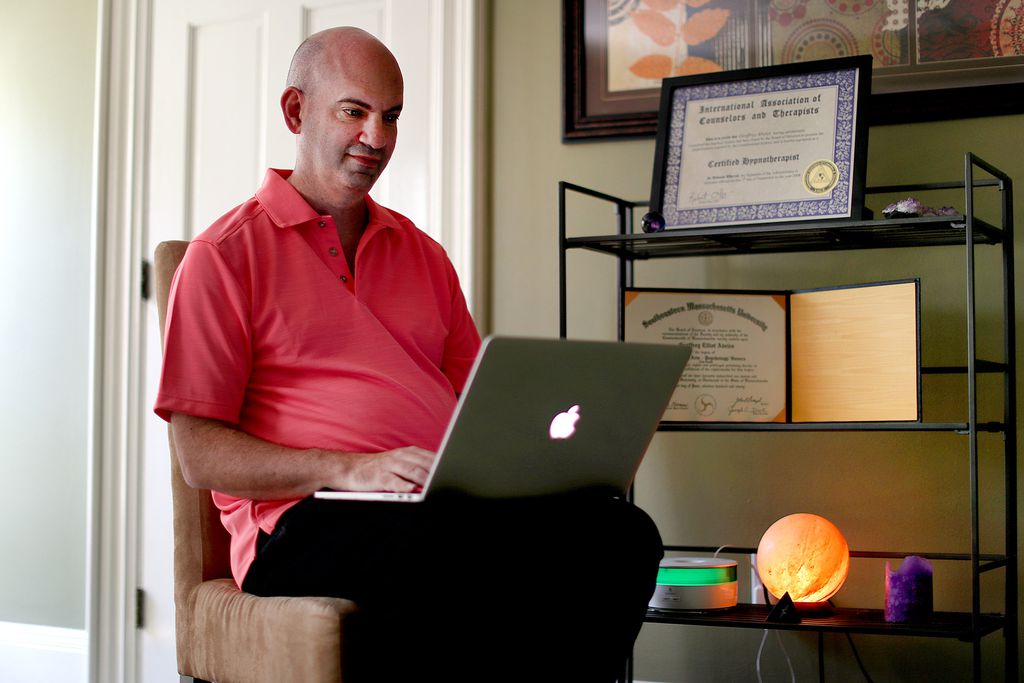Remote work made life easier for employees with disabilities. Advocates say the option should stay
The pandemic upended corporate culture as workers traded office buildings for their kitchen tables. For most, the change was largely a matter of convenience. But for many people with disabilities, it was transformative ― getting to and from a workplace was the most arduous part of their day.
From the city to the suburbs and beyond, getting from one point to the other in a timely fashion has always been complicated for them. Some Boston workers live in rural towns far from public transit stations and are either unable to drive to work or need support to do so.
The Boston Center for Independent Living has worked closely with the Massachusetts Bay Transportation Authority to ensure accessible public transit, said executive director Bill Henning. But while most MBTA routes do include accommodations for disabilities, not all stations are wheelchair-friendly.
And people with vision problems may find it hard to navigate a bustling city, especially during peak commuting hours.
Andy Forman, senior disability advocate at BCIL, is legally blind. Prior to the pandemic, he said, commuting from Plymouth to Boston for work could take up to two hours each way. Because he cannot drive, a family member would drop him off at the Kingston commuter rail station.
“We can be productive working at home,” Forman said. “I can attend health care committees or legal committees on Zoom. If I get mail in the office, it can get sent to me or scanned to me.”
One of Forman’s clients is Geoffrey Abeles, owner of Acton-based alternative therapy practice Energy2Heal. He has intestinal permeability, a condition that induces chronic fatigue, making it difficult for him to maintain a steady schedule. Abeles said Forman has been instrumental to helping him avoid homelessness during the worst of the pandemic.
Abeles also said seeing clients remotely at his own practice has ”helped me to reduce the fatigue of the physical wear and tear on my body and adrenal system.”
In addition, being able to work from home conserves valuable energy for people whose disability taxes their stamina or who take medications that may make them drowsy.
The physical toll of a long commute is all too familiar to 49-year-old Barry Chan, who’s had trouble walking long distances since suffering a stroke in 2018, which also left him with a speech impediment. Chan was working as a restaurant manager at the time, but he couldn’t keep the job because of his health crisis.
Chan, who is still looking for work, said a job that allowed him to work from home would be a game changer. Aside from avoiding the commute, he could communicate through text or e-mail — which he prefers over speaking because people often have difficulty understanding him.

The technology that accompanies remote work can also alleviate many of the barriers that people with hearing loss face in the office. It’s “very easy” to integrate closed captioning into Zoom meetings, said Kathy Petkauskos, director of disability employment service Work Without Limits. It also makes using a sign language interpreter more practical because they no longer have to be on-site for meetings.
The changes prompted by the pandemic should lead companies to offer more virtual engagement going forward, she said.
“Before we go back to how it was,” Petkauskos said, “maybe make this an opportunity to really leverage the experience that we just had through the pandemic to be more inclusive of people with disabilities in the workplace.”
A pre-pandemic study from Harvard Business School found companies also can benefit from allowing employees to work from home or, in some cases, from anywhere. It said it can increase productivity, reduce turnover, and lower costs.
“We have constrained employees to geographies that are not ideal for them,” said researcher Prithwiraj Choudhury, an associate professor in the school’s Technology and Operations Management unit. “This is a real opportunity to free people by letting them flexibly choose their location.”
One man interviewed for the Harvard study said was able to move out-of-state to a city that provided the best treatment for his daughter’s medical condition. Factors like these boost productivity not just because they inspire employee loyalty, according to Choudhury, but because they strip away barriers that may prevent people from working at peak efficiency.
And as productivity increased at many companies, so did revenue. That, combined with significant savings on real estate and utilities, means businesses have the potential to be more profitable through remote work long term.
“I don’t think this genie is going back in the bottle,” Choudhury said. “Companies which embrace this and plan for this and manage this change better are going to become the winners in the labor market.”
Remote workwas on the rise even before the pandemic, said Tom Murphy, supervising attorney at the Disability Law Center in Boston. But the pandemic immediately quashed the apprehensions of corporate employers that had denied telecommuting accommodations to employees with disabilities.
Some had worried that certain essential job functions can’t be performed at home, while others thought job performance might suffer if an employee wasn’t in an office. Post-pandemic, Murphy said, employees with disabilities may be more inclined to file lawsuits against employers who refuse to grant them accommodations.
“Previously, the employer had to make a determination as to whether they can do their job at home successfully just based on the information available at the time,” Murphy said. “What has changed is that we have a year and a half of experience now with people working remotely in certain jobs, and that is something that the court would take into consideration.”
____________________
Source: Boston Globe






